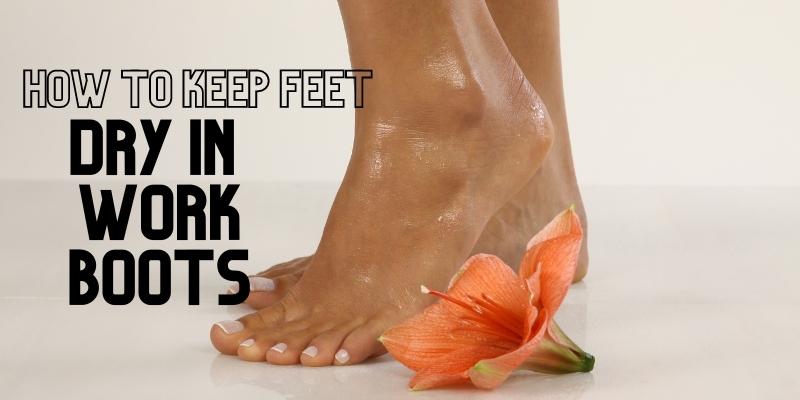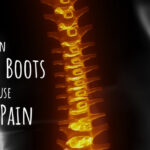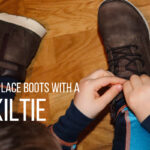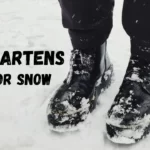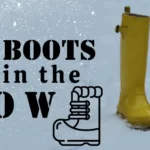Last Updated on January 24, 2024
Feet are the essential part of your body when it comes to working. They’re what connect you to the ground and allow you to stand, walk, run, jump and do all sorts of other activities that keep you stable throughout the day. When temperatures start rising or if you find yourself working in an environment with low air-conditioning at times like summertime or a hot factory floor, your feet can become overheated very quickly, leading to problems including blisters, discomfort, and lack of concentration.
Sweaty feet can be a nightmare for any person, but this is especially true for those who wear shoes or boots not designed to keep them cool. If you are looking for ways to keep your feet dry in work boots, then this article is perfect for you! Here are eleven tips on how to keep your feet dry in work boots.
11 Tips to keep feet dry & cool in Work Boots

1) Keep your boots clean and dry

One of the most important things you can do to keep your feet cool in work boots is to keep them clean. It would help regularly wipe down your shoes’ insides with a cloth or an antibacterial spray, so they don’t become damp, which leads to smell.
This practice will also help get rid of any debris such as dust, dirt, sand etc. If possible – try wearing black cooling socks (less visible) and change into fresh ones every day.
2) Use insoles that soak up sweat and keep you cool

Many different shoe insoles are available on the market these days, designed to help absorb excess moisture from your feet while keeping them dry and healthy. These can work great for people who suffer from sweaty or smelly feet – especially if it’s a hot day outside.
Some options include Coolmax technology, Silver-based materials (for antibacterial properties), gel pods that provide shock absorption. All of this will allow your shoes or favorite slip on work boots to breathe better, so they don’t feel as warm inside.
3) Ensure boots fit properly

Proper boots fit will get rid of foot pain and prevent any unnecessary problems such as blisters developing later down the line. If your shoes don’t work well enough – they won’t be able to keep your feet dry and may even cause damage such as blisters, corns etc. That is why you must get them fitted properly by a professional if needed.
4) Don’t wear the same pair of Work Shoes every day
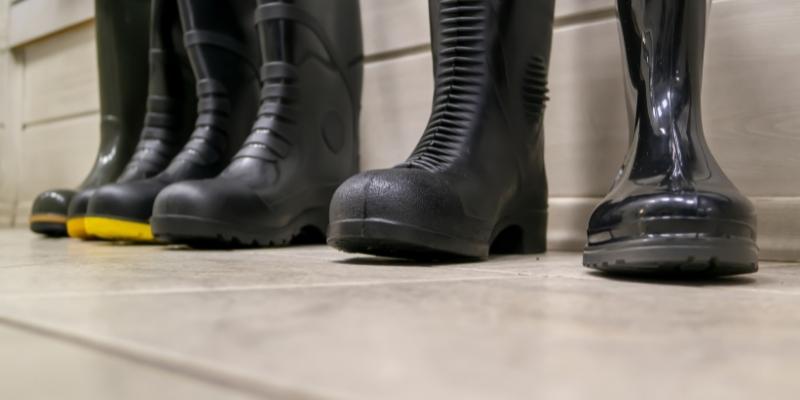
It is not suitable for the health of your foot or skin to wear sweaty, tight shoes every single day, especially in hot environments like summertime. To avoid this happening, try alternating between two different pairs of work boots each week during those warmer months (while ensuring both are comfortable). Not only will this allow the feet to stay clean and let any moisture evaporate naturally, but it will also help prevent problems later on down the line, including smelly, damp, sweaty feet.
5) Wear socks that fit correctly and wick away moisture

If wearing a pair of work boots during summertime, it’s essential to wear the correct type of cooling socks for work boots and ensure they are not too tight or loose on your foot which can cause problems with excessive sweating.
A good option for hot weather is lightweight cotton socks which you should change out after working. These cotton socks are best socks for sweaty feet as they absorb moisture in work boots . It’s also a great idea to alternate between two different pairs every other day – this will help reduce any sweat build-up from happening in one pair of shoes over an extended period.
6) Take regular breaks in your shoes
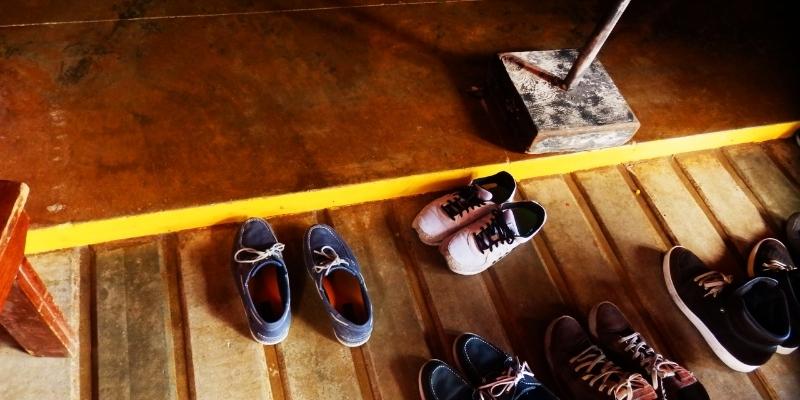
A short break is significant if you are wearing closed-toe work boots in hot environments like construction sites, factories, ranches, and many other relatable workplaces. Spending too much time in the same pair of sweaty, smelly or damp footwear can cause problems with feet getting all sweaty and moist.
If possible, try to take a break from them every couple of hours so they have a chance to dry out naturally by letting excess moisture evaporate, which will help keep them fresh-smelling and prevent any foot discomfort later on down the line.
7) Keep hydrated throughout the day

It’s easy to forget about drinking enough water during the summer months, but it can be hazardous if this continues over an extended time. Therefore, it’s essential to drink lots of water throughout the summertime (at least three liter), especially if doing manual labor for an extended period.
According to U.S National Academies of Sciences, Engineering, and Medicine daily fluid intake must be :-
- 3.7 Litres ( For Men )
- 2.7 Litres ( For Women )
Hydrating helps keep you more comfortable and prevent any problems with excessive perspiration later on down the line, leading to moisture build-up inside your shoes. Remember, hydrated feet also feel better.
8) Try wearing ventilated or breathable footwear
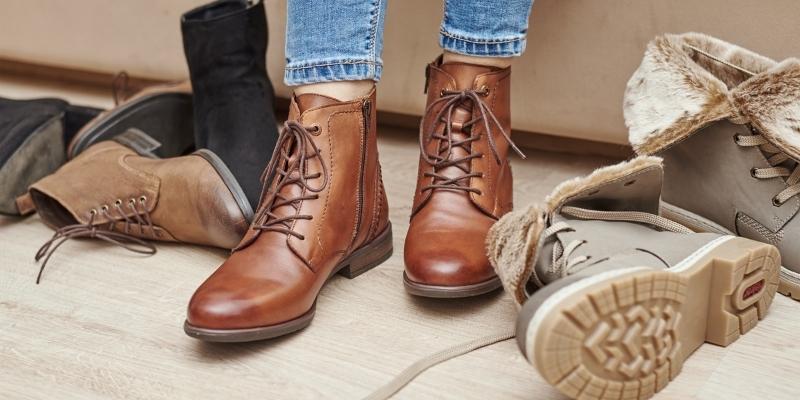
If you’re looking for a way to keep feet dry and prevent any perspiration problems, then ventilated footwear is worth checking out as they allow your shoes to breathe better, which helps the whole foot stay much cooler. This footwear acts as a cooling shoes for hot feet.
One another way to keep feet cool is adding holes. Ventilation can be added by punching holes in fabric uppers, using mesh materials, or exposing more of the interior airflow. These things help reduce moisture build-up inside work boots during summertime, preventing them from getting smelly over long periods. Remember this can damage your work boots.
9) Take advantage of technology
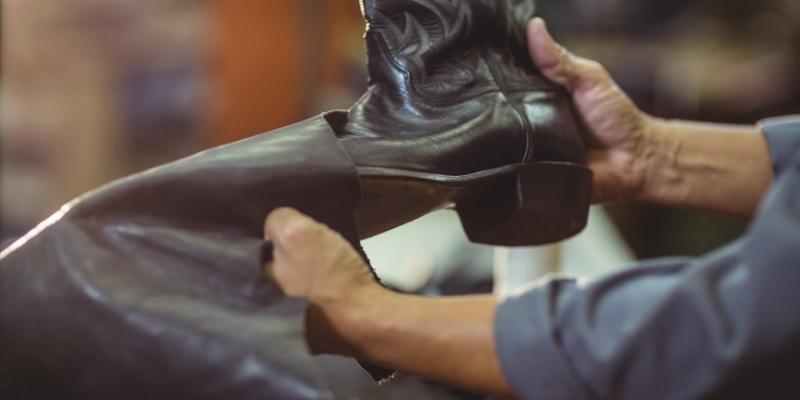
There are many options available today that can help keep feet cool at work, including special insoles explicitly designed to wick away excess sweat, unique fabrics commonly used now such as polyester knits etc can also be used. If possible, try to look for a tech company that specializes in this area as they should have the best options available.
10) Use foot powders or sprays before putting boots on

If possible, it is a good idea beforehand if you’re going to be wearing TPU toe, steel toe or closed-toe work boots all day long. Either use some foot powder or some spray designed for this purpose as these can help keep feet dry and smelling fresh – also feel free to reapply after taking the boots off.
11) Try using a cooling gel pad

Some people also use cooling gel pads in their socks or boots. Cooling gel pads are one of the best options for those sweltering summer months. You can either slip gel pads inside your work boots or place them on top of the insoles as they help keep feet much cooler than usual and help prevent any odour causing bacteria from growing.
The pad provides a slippery surface that cools the feet when they sweat. Since it is slip-resistant, there is no need for shoe inserts. The gel pad is usually placed in the bottom of the boot. Some people also put it on top for added comfort or to protect their feet while they walk. These pads are usually found at sporting goods stores, online retailers and medical supply companies.
Why do feet sweat in Work Boots?

Sweating is a natural defense mechanism for regulating body temperature. However, excessive sweating can be embarrassing and uncomfortable when it occurs more than what’s normal to the individual’s system, and dangerous if not dealt with properly. These kinds of severe cases are debilitating for many people – interrupting their careers, relationships, and self-confidence!
Excessive sweating (or Hyperhidrosis) affects millions around the world which makes up 5% total population diagnosed globally at present. According to a research from Saint Louis University, almost 2.8% of population alone in USA is suffering from Hyperhidrosis.
People’s feet sweat when their shoes are too tight, and they don’t allow adequate airflow. Abrupt temperature changes, such as going from hot to cold, will also make the feet sweat (due to a reaction in the body). Certain materials and cushioning in the work boots can also affect how much moisture is absorbed into the socks, which then comes out onto the skin, giving you that icky feeling of sweaty feet.
Major contributing factors
The foot only has tiny pores on its surface; perspiration isn’t distributed over a larger area, so it gets damp quickly. Feet tend to be less sensitive than other areas of your body, so lack of feeling or sensation can contribute towards sweating more.
For example, when we exercise, our sweat levels increase, and we don’t feel as though we’re sweating until the sweat has evaporated from our skin. Sometimes, you can be unaware of how warm it is, especially if your feet are enclosed in closed shoes or boots (such as work boots), limiting airflow and increasing perspiration because there’s nowhere for that excess moisture to escape.
PRO Tips – Avoid Waterproof & Insulated Work Boots
If you work in the winter, it’s essential to wear appropriate footwear. We recommend non-rubber, non-insulated and waterproof work boots for cold weather but remember they seal your feet so much that it means more sweat! For hot summer days on sweaty floors, don’t forget breathable shoes or athletic socks as an alternative option that will help keep athletes’ feet away altogether with protection against blisters (not just frequent ones). Always try to go for spacious leather work boots. We will never recommend insulated pull on work boots for summers.
Seek Medical Advice

There are various solutions we presented above to the problem of sweaty feet. If your work boots sweat even though they’re not being worn, then this could mean that hyperhidrosis. You need professional attention from a doctor instead; if so, don’t hesitate.
Seek out medical help immediately because sweating in these situations isn’t normal. Visit Medical specialists who will determine what’s causing them. The medical professional will provide other possible interventions like prescription medications designed specifically with individuals suffering from excessive sebum production.
Furthermore, if you are suffering from any other disease like Plantar Fasciitis you will have to be more careful.
Frequently Asked Questions
There are several ways to absorb moisture in work boots. One common method is to use moisture-wicking socks, which are designed to pull moisture away from your feet and into the sock. Another option is to use insoles or inserts that are made with moisture-absorbing materials like charcoal or activated carbon. You can also try using moisture-absorbing powders or sprays that are specifically designed for footwear.
To keep your feet from sweating in rubber boots, it’s important to choose the right socks. Look for moisture-wicking socks made from breathable materials like cotton or wool. You can also try using antiperspirant on your feet before putting on your boots. Another option is to use foot powder or spray that is specifically designed to reduce sweating.
To keep your feet dry all day, it’s important to start with a good pair of shoes or boots that are waterproof or water-resistant. Look for shoes that are made with breathable materials and have moisture-wicking properties. You can also try using moisture-absorbing insoles or inserts to help keep your feet dry. It’s also important to change your socks frequently throughout the day, especially if you’re sweating. Avoid high temperatures and minimize your exposure at such places.
There are a few reasons why your feet might get wet in waterproof boots. One possibility is that the boots aren’t actually waterproof or water-resistant, even if they’re advertised as such. Another possibility is that water is getting into the boots through gaps or seams. Additionally, your feet may be sweating, which can create moisture inside the boots. It’s important to choose high-quality waterproof boots and make sure they fit well to prevent water from getting in.
Yes, you can put baby powder in your boots. Baby powder can help absorb moisture and odor, making your boots more comfortable to wear. Just be sure to use a small amount and evenly distribute it throughout the inside of the boot.
Baby powder can help absorb moisture and keep feet dry, but it’s not a foolproof solution. It’s important to choose the right socks and footwear to help keep your feet dry, especially if you’re doing activities that may cause you to sweat. Using moisture-wicking socks, breathable footwear, and other moisture-absorbing products in combination with baby powder can help keep your feet dry and comfortable.
To prevent athlete’s foot in work boots, it’s important to keep your feet clean and dry. Make sure to change your socks frequently and choose moisture-wicking socks made from breathable materials. You can also use antifungal powders or sprays on your feet and inside your boots to help prevent fungal growth. It’s also important to allow your boots to dry completely between uses and avoid sharing footwear with others.
Vaseline can help moisturize dry feet and provide a protective barrier to prevent further moisture loss, but it may not be the best solution for everyone. If you have very dry or cracked skin on your feet, you may need to use a more intensive moisturizer to see significant improvement. Additionally, it’s important to wear appropriate footwear and socks that help keep your feet dry to prevent further dryness or damage.
Final Words
There are many ways to prevent sweat from accumulating in shoes/boots during humid weather by using different insoles, powders etc. Remember that keeping feet dry & cool is essential if one wants comfortable work footwear and happy, healthy feet rather than sweating smelly ones! These tips should help with staying cool & dry throughout while wearing work boots. If anyone has any other suggestions, please leave them in the comment section below!
As a child, Joey's career spanned a wide range of fields. These include farms, ranches, warehouses, construction sites, etc. Wearing good work boots was essential on all those sites to avoid distractions. As a result of his experience, he can determine which work boots are most appropriate for a particular workplace. Following Joey's work boots, his colleagues and teammates also purchased work boots based on his advice. Therefore, his friends suggested that he start a blog so that he could also help others.

